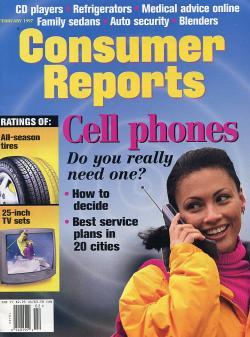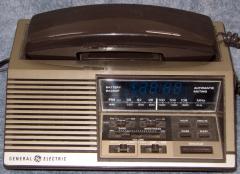
Margie and I were not particularly early adopters of this technology, but we did get cell phones sometime around 1994 or so. They seemed to be reasonable things to have in case of an emergency on the road, and we could afford them. But we didn't use them very much, as we paid by the minute. I recall an incident outside the Wayland High School Little Theater, when Margie talked on her cell phone while picking up our daughter Sara after a rehearsal. Sara was upset with her mother for using her cell phone in front of other people, which Sara thought was pretentious. Now, about 15 years later, Sara's only phone is a cell phone.
The purchase of this unit would mean Elissa could have a private telephone in her room. We contemplated whether this was okay, decided it was, and bought it. Of course, I had to snake a telephone wire up into her room from the basement, but this was not hard to do. With two sociable daughters, there was a great deal of contention for use of our home telephone line. In the end, to bring peace to the house, it was necessary for us to add a second line. Note 1 In earlier days, it would not have been possible for me to purchase a telephone, and then wire it up myself. The telephone companies being a regulated monopoly, they didn't sell you phones, but rather they leased them to you (and the more phones you had, the more you were charged per month). They also did all of the in-house wiring. That way, they controlled all the technical aspects of the system. But in 1982, the culmination of an antitrust lawsuit filed by the U.S. Department of Justice in 1974 resulted in an order to break up the Bell System, although this was not completed until 1984. The goal, and the effect, was to open up competition in the telecommunications industry. This was also made possible in part by technical advances that allowed the system to be run with less need for ironclad control by a single entity. The United States has generally had an excellent telephone system, run by private companies, but regulated. The telephone systems in most European countries are government run, and have often had problems. I came across some of those problems in France, in the late 60s. I had the good fortune to be able to stay in an apartment in Paris for free. It was loaned to me by a family friend, who maintained the apartment for use by his import business. Sometime during my stay in the apartment, the telephone stopped working. The apartment had a concierge, so I informed her of the problem. The next day, she told me that the situation was disastrous. Apparently, being often absent, my host had arranged for his bank to pay his phone bill. The bank had forgotten to do so, which was why the telephone had been cut off. I suggested that the bank had only to pay the bill, and the service would be reinstated. The concierge told me it was not that simple. Once the service was cut off, my host would have to reapply for a new telephone line. And the waiting list for a new telephone line in Paris at that time was three years. Since my host used the apartment for business, he needed to have a telephone. Thus, the concierge suggested, the only way he could get an apartment with a telephone would be to sell his apartment, and buy a new apartment with a telephone already installed. Furthermore, since he would have to sell his apartment with no telephone, he would take a large financial loss on the sale. I told the concierge that I couldn't quite believe that he would lose his phone in that way for having missed a single bill. At that point, she informed me that the problem was actually that it wasn't the first time. The bank had previously missed paying a bill, but my host had been able to fix up the situation, because he had a friend who was a government "ministre". (In France, a ministre is like a US Federal Government "secretary", as in "Secretary of State"). The concierge was not confident about my host's ability to get away with this a second time. The telephone was not reinstated during my remaining stay in the apartment, and I don't know how the situation ultimately worked out. Many years later, the telephone system in France was far ahead of the systems in the United States, with touch-tone phones and attached Minitel terminals for telephone "Information" ("Information" is now called "Directory Assistance"). Of course, the United States is a much larger country, and the telephone system had to cope with a variety of private companies providing service in different areas. When cell phones came along, Western Europe was able to agree on a single standard, the GSM system. Note 2 As is so often the case in the United States, the companies here were unable to agree on a single standard, and each went its own separate way. As a result, cellular telephones in the United States follow a host of different standards, and if you change from one company to another, you often have to buy a new phone. It's been interesting to watch the way cell phone charges seem to repeat the history of charges for wired phones. Initially, with a wired phone, you were charged individually for every call. Then, free calling zones began to appear. We could pay a certain amount per month in order to be able to call nearby towns for free. Pay a little more per month, and we could pick up other zones. In particular, we paid extra to be able to make unlimited calls to Boston, and unlimited calls to Western Massachusetts, where one of my sisters lives. Since phones were heavily used by businesses during the day, the phone company offered cheaper calling in the evening and on weekends, when businesses were closed. Eventually, we could pay more to be able to make unlimited long distance calls. The first time I was offered a plan with unlimited long distance calls, I was rather startled. I had gotten used to the idea that we ought to pay more for calls to a more distant telephone. But in reality, once long-distance calls began to be carried on microwave links, they cost the phone companies very little. The real expense for maintaining a wired telephone network is maintaining the actual wires that are needed between the local exchange and each individual house. Phone companies call this, "the last mile", and it accounts for most of the cost of the wired network. Cellular phone service started charging in the same way, charging for each and every call. They also offered users cheaper or even free calling in the evening and on weekends, and different cellular companies began competing in this area. I recall one company making a big deal of their rates dropping at eight o'clock, instead of nine o'clock. Eventually, free unlimited long distance arrived to cellular contracts as well. Cellular price plans are constantly changing, as companies jockey for position in the market, while at the same time trying to get the maximum revenue from their customers. Of course now, there is also a great deal of competition in the capabilities of the phones themselves. As noted at the beginning of my previous entry, "Telephones", cellular phones are now more than just phones. In fact, they sometimes aren't really great phones at all. Users buy them as smart phones, often more for their other capabilities than for what they can do as actual telephones. For both of my daughters, cell phones are their only phones. My wife and I still have a wired phone in our house. But it no longer uses a twisted pair of copper wires, which the telephone companies call "POTS", for "Plain Old Telephone Service". Quite some time ago, we transitioned to a telephone service from our cable company, Comcast. We then subsequently changed to a fiber optic service called FiOS, from Verizon. We thought long and hard about changing our home phone service. Telephone service over copper wires is extremely reliable, surviving power outages and even telephone lines being downed by falling trees during storms. The thick cables in which these wires are carried survive all sorts of disasters, including being downed by trees. They also bring into the house the power needed to keep the phones running, so your service is not lost if you lose electricity. It was really the arrival of cell phones which gave us the confidence to change our telephone service to these more modern alternatives. Since my wife and I each have a cell phone, it no longer would seem like such a disaster if our wired phone went out of service for a little while. In fact, a backup battery keeps our phones running during a power outage, and to date, we have only once had an outage so long that the battery could not bridge it (during Hurricane Irene, in August of 2011). Third World countries now often get cell phone coverage before they get wired phones. This is because wired phones require a huge amount of infrastructure, which needs to be supported by a large number of people who can pay for them. In contrast, a cellular phone network requires only a few scattered towers, interconnected with a more limited number of wires or microwave links. Therefore, developing countries often have large areas which are covered by cellular phones, but which don't have wired phones available. My daughter Elissa was once atop one of the Bale Mountains in Ethiopia, and actually heard someone talking on a cell phone say, "Can you hear me now?" Note 3
  Note 1: Since both daughters would frequently be on the phone at the same time, having two lines made our lives much easier. If Margie or I wanted to make a call, the rule was that we had first dibs on our main line. So whichever daughter got the second line first could continue talking uninterrupted. The main line was less desirable, because Margie or I might interrupt the user. But since Margie and I had much briefer conversations, this was not much of an issue. [return to text] Note 2: GSM is now said to stand for the "Global System for Mobile Communications", although it originally came from the French "Groupe Spécial Mobile". [return to text] Note 3: For future readers who might not get this reference: Beginning in 2001, the cellular phone company Verizon Wireless ran a series of television ads in which a Verizon technician wandered from place to place saying into a cell phone, "Can you hear me now? - good!"
This advertising campaign was very successful, and the catchphrase, "Can you hear me now?" became well known. The technician was played by an actor named Paul Marcarelli. As of November, 2011, he's still under contract with Verizon. Elissa found it amusing to hear this said in a real world situation on top of a mountain in Ethiopia. The speaker was just a random telephone user, not a Verizon technician, since the telephone company providing the service in Ethiopia was certainly not Verizon. And in fact, Elissa reports, the speaker may not have uttered those exact words, but he said something more or less equivalent (hey, it's a great story). In the Bale Mountains, "Bale" is pronounced "BAH-lay". [return to text]
 |


 This was intended to emphasize Verizon's strong point in the cellular telephone market, which was their excellent coverage across the United States. It also emphasized the continual testing and improvement of their network, in an attempt to reduce as much as possible the number of dead zones in their cellular coverage.
This was intended to emphasize Verizon's strong point in the cellular telephone market, which was their excellent coverage across the United States. It also emphasized the continual testing and improvement of their network, in an attempt to reduce as much as possible the number of dead zones in their cellular coverage.